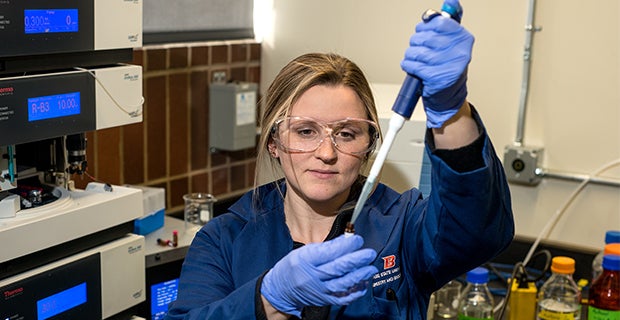Boise State’s second annual Research Month is April 2018. Research Month celebrates the diverse and fascinating array of research happening each day on campus.
“Acrylamide” is an unfamiliar word to most people but here’s one that attracts immediate attention: “cancer.” Recent research suggests a correlation between acrylamide – a chemical compound that can form in some foods during high-temperature cooking processes, such as frying, roasting and baking – and cancer risk. This news is especially economically concerning in a state like Idaho, which is the nation’s largest potato processor.

“Unfortunately, it’s not known at what level acrylamide is a problem, and products can contain anywhere from 200 to 12,000 parts per billion,” explained Boise State biomolecular sciences doctoral candidate Maranda Cantrell.
“In short, Idaho’s potato industry is at risk of market paranoia from acrylamide,” added Owen McDougal, chair of the Department of Chemistry and Biochemistry.
Fortunately, Boise State researchers have received funding to devise a method to evaluate acrylamide in food products, thanks to a two-year specialty crop block grant awarded by the Idaho State Department of Agriculture.
Acrylamide occurs as a carcinogenic byproduct of the heating process, when proteins degrade and mix with sugars, like those found in abundance in potatoes. The more a food (like a potato) is cooked, the more acrylamide forms. The carcinogen also is found in coffee, toasted nuts and some breads. As a link between acrylamide and cancer has been established, governing bodies including the state of California and the European Union have adopted regulations to label whether acrylamide is present in locally produced and imported foods.
“Obviously, there is concern over incidents of cancer, and discovering what are the causative agents contributing to cancer rates in the U.S.,” McDougal said. “Elimination and posting of causative agents that could potentially lead to cancer is something that states and countries are being conscientious about.”
Still, researchers like McDougal are careful to note that to date, studies have been inconclusive about if acrylamide is a problem and if so, at what level.
“The concern is that the California market could mandate that acrylamide levels be posted, which would make it hard to continue to work with them, as Idaho potato processors currently don’t have that information,” McDougal said. “Our project seeks to address that.”
Cantrell will be developing methods for detecting levels of acrylamide in various potato products, from raw potatoes to fry samples taken from restaurants. The goal is to create a testing method that can be implemented by potato processors – and other processors, such as coffee producers – to ensure acrylamide levels are minimal and within compliance of future government regulations. Essentially, Boise State researchers are hoping to help processing industries demonstrate that their products are safe for public consumption.
“How food has been made has been studied a lot, but what the issues that arise when you make certain processed products – like fries and potato chips – those are still unknown,” Cantrell said. “In essence, we’re using technology to reimagine food without knowing how it will change it. That fascinates me.”
This food chemistry project is just one the Department of Chemistry and Biochemistry recently has undertaken. Boise State researchers also are evaluating the toxicity of onion slurry – a common byproduct of onion processing – to determine whether it is safe to feed to cattle, and analyzing the degradation of proteins caused by dairy processing. In addition, this fall Boise State will offer the first University Foundations 100 food chemistry class, with the goal of informing Idaho’s students about the food they eat.
“Our goal is to engage area industry in meaningful ways,” McDougal said. “We have an agriculture-based economy in the state, and based on agricultural research, there’s a significant opportunity to engage with partners across the state – a lot of research, learning and career opportunities for both faculty and students.”